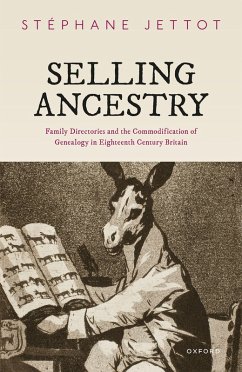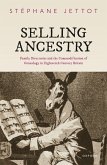Often cited but rarely studied in their own right, family directories allow a reconsideration of how ancestry and genealogy became an object of widespread commercialization across the eighteenth century. These directories replaced the expensive, locally-produced, early modern artefacts (tombs, windowpanes, illuminated pedigrees), and began to reach a wide audience of readers in the British Isles and the colonies. From the first Peerage in 1709 to the guidebooks of Debrett's and Burke's in the 1830s, St?phane Jettot offers an insight into the cumulative process leading to the creation of these hybrid products -- a combination of court almanacs, county histories, and town directories. Employed by contemporaries as reference tools to navigate through a dynamic and changing society, they could be used as a means to probe contemporary attitudes towards social status and political events. Published by the most prominent London booksellers who shared their copyrights among themselves, they relied on the considerable involvement of thousands of families in the counties. In their correspondence with publishers, many new and old elites desired to insert their own narrative into a general history of Britain by dispatching documents, quotations, and anecdotes. Based on a unique source-base, this book provides a systematic review of these directories, their production, and sale, but also their potential role in shaping the character of social change. Jettot demonstrates the wider ramifications of genealogy and its structural ability to reinvent itself, associate amateurs and antiquarians alike, and thrive on the wavering lines between facts and fiction, offering an exciting and unique insight into the social history of eighteenth-century Britain.
Dieser Download kann aus rechtlichen Gründen nur mit Rechnungsadresse in A, B, BG, CY, CZ, D, DK, EW, E, FIN, F, GR, HR, H, IRL, I, LT, L, LR, M, NL, PL, P, R, S, SLO, SK ausgeliefert werden.









